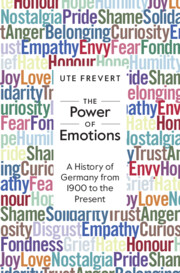Book contents
Summary
Honour is an emotion unfamiliar to many these days. In post-war West Germany, honour was rarely mentioned, let alone felt, though it bravely hung on when children (and sometimes adults) promised their ‘word of honour’. Around 1900, however, the term honour had ‘a very strong sentimental value’, German men still ‘possessed’ honour and felt it ‘in their bodies’. Not incidentally, the motto emblazoned on the belt buckles of SS uniforms since 1932 read ‘my honour is loyalty’. This chapter explains how female honour differs from this, what – allegedly – puts it in danger, and how, in turn, women are endangered by it, not least through the phenomenon of so-called ‘honour killings’. The chapter shows the increasing tendency to replace honour with dignity, which has the advantage of being fundamentally inclusive because it was granted without discrimination to all. This made it a more suitable concept than honour for modern societies that considered themselves egalitarian.
Keywords
- Type
- Chapter
- Information
- The Power of EmotionsA History of Germany from 1900 to the Present, pp. 194 - 208Publisher: Cambridge University PressPrint publication year: 2023

